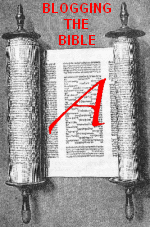 There’s a wonderful pair of verses in the book of Proverbs. The first of the verses is 24:17 which is a very famous verse. I’ve seen it used many times to show the righteousness of the Bible and I believe I’ve even seen it in a Jewish context as a way of showing that the New Testament doesn’t introduce anything new, since every idea of value has already been brought up in the Hebrew Bible. This is the verse: “Rejoice not when your enemy falls, and let not your heart be glad when he stumbles”.
There’s a wonderful pair of verses in the book of Proverbs. The first of the verses is 24:17 which is a very famous verse. I’ve seen it used many times to show the righteousness of the Bible and I believe I’ve even seen it in a Jewish context as a way of showing that the New Testament doesn’t introduce anything new, since every idea of value has already been brought up in the Hebrew Bible. This is the verse: “Rejoice not when your enemy falls, and let not your heart be glad when he stumbles”.
But these polyanna interpretations miss the next verse which places it in a context of some nice realpolitik: “Lest YHWH see it, and it displease Him, and He turn away His wrath from him.” I always get a laugh out of this since it completely subverts the liberal turn-the-other cheek reading. The whole point of empathy for your enemies is to minimise your chances of punishment and to maximise the chances YHWH will punish your enemy! I also marvel at the double-think of being empathetic for the sake of your enemy’s destruction — this is some serious Kung Fu action grip stuff.
This is even more apparent in another part of Proverbs (25:21): “If your enemy be hungry, give him bread to eat, and if he be thirsty, give him water to drink”. Drum-roll for the next verse: “For you will heap coals of fire upon his head, and YHWH will reward you”. Yep, it’s a brilliant trick but is as far from any of our projections of an idealised Biblical morality as can be.

1Sam 25 is a chapter dedicated entirely to these sentiments. David is still fleeing Saul. He and his men need food so he approaches Nabal, a rich landowner. He sweet-talks to him and asks if he and his men can please have some stuff. Nabal responds (v10-11): “Who is David? and who is the son of Jesse? there are many servants now-a-days that break away every man from his master; shall I then take my bread, and my water, and my flesh that I have killed for my shearers, and give it unto men of whom I know not whence they are?”. Naturally David is mightily pissed off and is ready not to leave “so much as one male” alive (his words!).
Enter Abigail, Nabal’s wife. When she hears what her idiot husband had gotten the both of them into, she hurries to David sweet-talks him, abuses her husband and gives him food. Her argument is that David shouldn’t kill Nabal lest it be a stumbling block for him in YHWH’s eyes — so she echoes the sentiments of the Proverbs verses perfectly. David agrees and tells her “blessed be thou, that hast kept me this day from bloodguiltiness”. Not because killing Nabal would be wrong but because it would damage his reputation in front of YHWH. And so by leaving Nabal he expects to heap coals on Nabal’s head.
Which happens (v38): “And it came to pass about ten days after, that the LORD smote Nabal, so that he died”. Oh, and then Abigali joins David’s harem. I find this so typical: one of the supposedly profound moral messages of the Bible has a completely opposite sinister meaning (on two separate occasions!) and the supposed morality fable that illustrates it through David is no better. It’s true, not killing Nabal is a step up from the usual morality described in the Bible. Still, what is seen as a pinnacle of compassion is to us a Bronze Age morality at best.
Oh, and finally Abigail’s message contains an interesting twist (v41): “Behold, thy handmaid is a servant to wash the feet of the servants of my lord”. Aah the feet, again with the feet!Though it probably doesn’t point to Abigail participating in orgies, one does wonder…





0 Comments